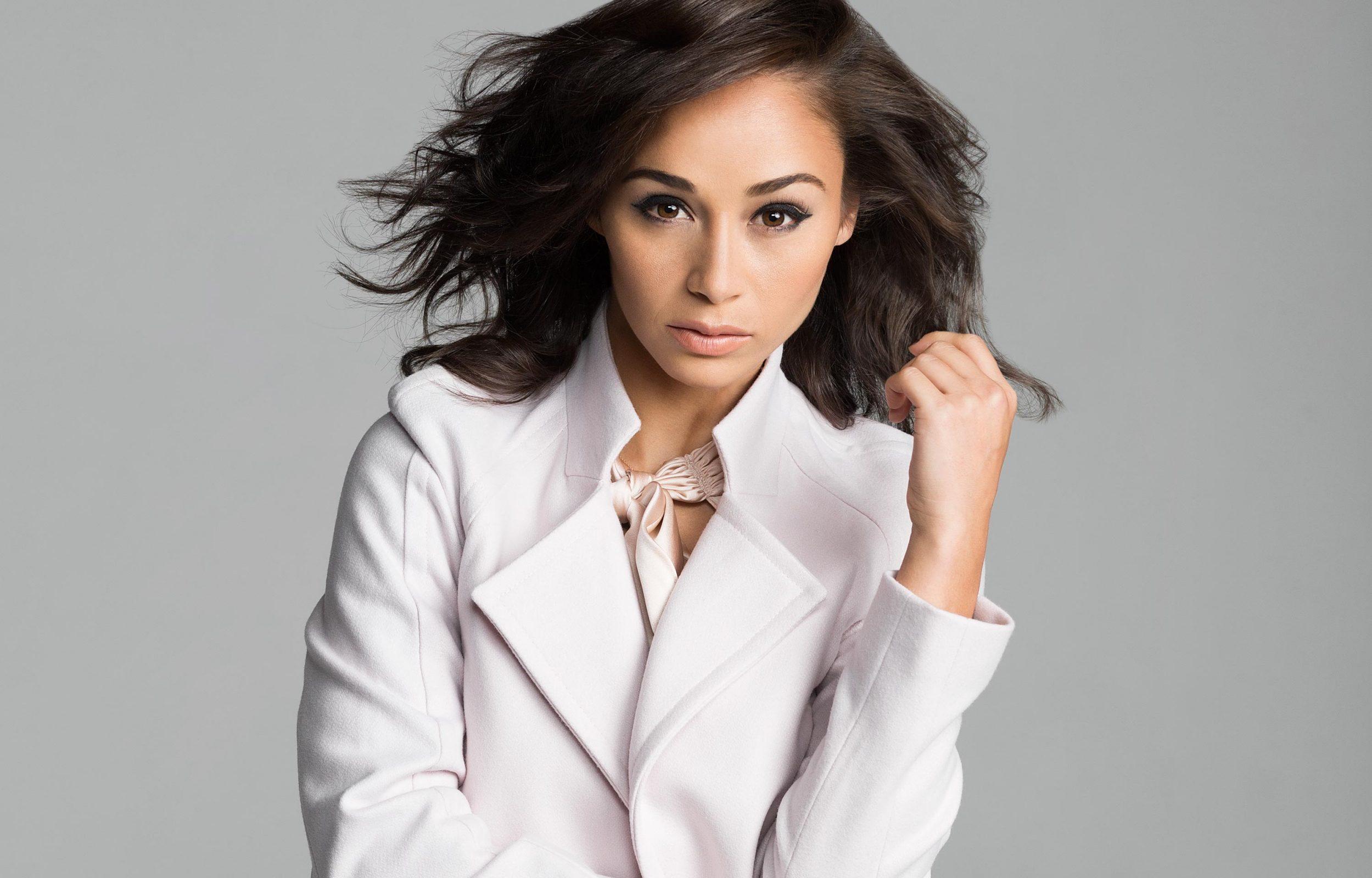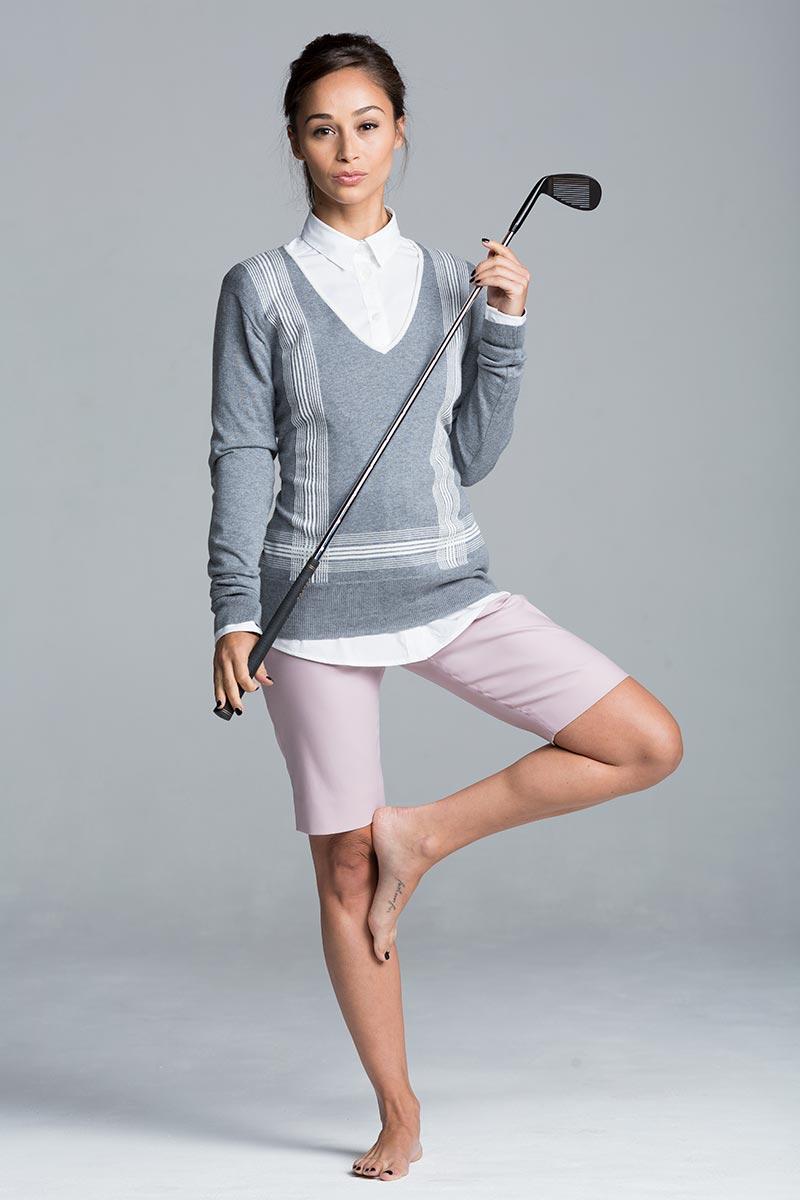
Fashion Icon Cara Santana Takes On The World
Do not get in her way. After a couple of hours with Cara Santana, that’s what I’ve got for anyone who doesn’t know her. Do not get in her way. At a slight 5’4”, Cara might not seem the most obvious of unstoppable powerhouses. But as with the cutting power of a small diamond, underestimate her at your own risk.
“I definitely was always a strong-willed person,” she says, chatting over lunch at a photo shoot in Hollywood. “You know that saying, ‘you have to touch the stove to know that it’s hot’? I’d touch the stove. I’d touch the stove again. I’d—YEOWCH!!!—I’d keep touching the stove until I was like, ‘Yeah, OK. It’s hot every time.’ I always marched to the beat of my own drum, and I credit that to my mom.”
“You know that saying, ‘you have to touch the stove to know that it’s hot’? I’d touch the stove.”
But we’re getting ahead of ourselves.
Cara Santana is an actress, writer and entrepreneur whom you might recognize from the television show Salem or from an episode of CSI or from her blog or her successful app or from one of the numerous other projects in which she’s been involved. Born in El Paso, Texas, just over 30 years ago, she’s also a golfer, and she got started with the game right about the time she decided she wanted to be an actress.
“I was very young,” she says. “Probably 5 or 6 years old when I started.
My dad really, really loved golf, and I’m a daddy’s girl, and it’s something we always did together. It was a bonding experience, it was something fun.”
“I would ride around in the cart with him when I started and he really created a love of the sport.”
Somewhere in childhood she found another love as well, and made what by any standard would be considered an early career decision—with a predictable response from her parents.
“When I told my parents, at 5 years old, that I wanted to be an actress, they thought, ‘Surely she’ll grow out of it.’ But then when I made my Power Point presentation as to why I should be able to go to boarding school for the performing arts…”
Wait, what?
“Yeah, they definitely helped me cultivate my love of art. But I think, as most parents do, they think you’re going to grow out of these ‘dreams of grandeur.’ And so at 13 years old I put together a Power Point presentation. I found this school outside of Los Angeles that specializes in young professional actors and I said, ‘this is where i should go, this is how much it costs, this is where it is, this is when we can go and tour the school.’ I think my mom said, ‘you know what, there’s two things we can do here: we can fight her on it tooth and nail and she’s going to be miserable, or we can support her and guide her in the right direction.’ And that’s what they did. They’ve always been incredibly supportive… even though I’m definitely sort of the, ‘wild child’ is probably a bit extreme, but my brother is quintessentially All American, went to university for four years, played football, got his bachelor’s.
You know, homecoming king. And I was the ‘outside of the box child,’ so to say. But my parents were always so, so supportive.” Cara’s father was supportive with golf as well, enrolling her in lessons at El Paso Country Club when she was about 9 years old. As it happens, the pro at that time, and thus Cara’s teacher, was Rich Beem, who went on to victories on the PGA TOUR, including a major win at the 2002 PGA Championship. Along with Cara’s father, Beem helped Cara to develop a love for the game.
“It’s something I realized that you could play no matter how old you were, no matter how much money you had,” she says. “It was male, female, there were no boundaries. You didn’t have to be strong, you didn’t have to be tall, you could be short. You just had to love the sport, and it was quiet and it was therapeutic.”
Today, the quiet aspect is one of the major draws for her, especially when the demands of work start to pile up for Cara and her longtime boyfriend, actor Jesse Metcalfe.
“Jesse and I, we travel all around the would,” she says, “and we play wherever we are, the Bahamas, South Africa, Scotland, London…
“We played the Old Course [at St Andrews] two summers ago and it was one of the most magical experiences I’ve ever had. We played two rounds in two days and—I’m not going to lie—I didn’t finish either. That Scotland weather, charming, with the rain and the wind. But it was so fun, so magical, so romantic. We have a framed picture in our house of the little bridge [over the Swilcan Burn, a St Andrews icon]. And this year we were watching The British Open and there they were playing at St Andrews, and I was like, I’ve been there! I’ve played that course! It’s so cool!”
Beyond visiting legendary courses, Cara says that playing the game offers her and Jesse a few hours away from the pressures and attention that Hollywood can bring.

“Golf is something that we enjoy doing together, and there’s something so calming about being on the golf course. It takes you out of the world you’re in, escapism, which is obviously a big part of my life.”
Cara’s escapism, her love of getting away from it all—which is so perfectly served by a few hours on course—was something she identified in retrospect, after she was committed to being an actress, when she’d graduated from school, at a point when her life choices forced her to gain some serious self awareness.
Perspective
“I got sober when I was 18 years old. It was drugs, drugs primarily. Cocaine. I never was really a big drinker, but as we say in [Alcoholics Anonymous], if you shoot it, snort it, smoke it, it’s all the same.
“I OD’d, and I don’t know if I’ve ever said that out loud: ‘I overdosed.’ I called the hospital myself. I think it’s so misleading because people think that you can’t OD on cocaine, but you can, and people do, and people die. And I was so afraid that I was going to have let down my supportive, loving, conservative Texas parents that I hid it from them for years, and I got sober on my own.”
When Cara finally did tell her mother, “a high-powered attorney,” as Cara describes her, and her father, who worked with the El Paso juvenile probation department, she was understandably nervous.
“I’d go home to see my parents, and my parents are very normal drinkers, like at Christmas: ‘let’s have a glass of wine or Champagne.’ And I was always like, ‘No, I don’t want to drink,’ and they never pressured me. They were just thought, ‘OK, she’s not a big drinker.’ Finally, five years into my sobriety, I felt like I was obviously living a lie, although it was a positive lie, and so I sat my parents down and I was so scared and my eyes were watering and, ‘I don’t know how to tell you this and you’re going to be so disappointed in me, but I’m an addict and I’ve been sober for five years and I don’t know how to tell you.’
“And they both, with tears streaming down their faces, said, ‘We’re so sorry that you felt like you couldn’t come to us, but we’re so proud of you that you’ve been able to become sober.’

When we don’t see color, don’t see race, don’t see sexuality, that is when we’ve evolved
“I had a beautiful childhood, which is really important for me to say, because I have two amazing parents, I never had anything really terrible happen to me, I have a wonderful younger brother. But I just had that ism, that thing that addicts have, and there was no stopping it as soon as I found the outlet of drugs and alcohol. It immediately gave me a sense of security, which acting did, because I was able to step outside of myself—I wasn’t Cara anymore, I was whatever this character was. And when you drink or when you’re using drugs you’re not aware of Cara, you’re obviously in a different mind frame, and so for me escapism is a huge part of my story.
Luckily, when I did get clean and sober, I had parents who were like, one, we love you no matter what and we’re so proud of you and we feel so bad that you felt like there was some disconnect and you couldn’t come to us. But also, what can we do to help you moving forward?’
A New Start
Now sober for more than 11 years, Cara tells her story matter-of-factly, though not unfeelingly. She clearly owns her past—and her future. And if she’s incredibly open, it’s down to her strength and her desire to shatter judgements.
“I feel like women feel more shame about and are more private about sobriety, and being a woman I think it’s a stigma,” she says. “As women, we don’t want to be scrutinized, we don’t want to be criticized, we don’t want you to interpret or to make an assertion about what that means for us because the truth of the matter is, like I said, I grew up in a perfectly lovely stable home, never had any egregious act ever committed to me, I have loving parents, I’m a smart woman, I went to school, I’m educated, and I’m an alcoholic, you know?”
The width of her perspective is also a credit to how her parents handled faith; her mother is Jewish and her father Catholic, but they set no limits on Cara’s personal spiritual journey.
“I was raised in the Jewish faith but my mother wanted us to have a very well rounded view of the world and so we went to an Episcopal school,” she explains. “I would go to Catholic church with my dad on Sundays just because I wanted to understand this other world, and it really formed the way I feel about religion and how I handle my religious or spiritual life as an adult. Certainly as a child I felt there was definitely conflict that played in because I would go to Hebrew school and I’d be like, ‘Well, Jesus doesn’t exist here.’ And then I’d go to my regular kindergarten through 9th grade talking about Jesus… There was definitely some conflict, but my parents were always there to talk about it, and I felt like it was the people inside religion that made me feel shamed by not understanding it as opposed to the people around me who were much more eager to discuss the differences.
“We had a Christmas tree and we had a menorah growing up, and my parents were like, ‘you shouldn’t stop there. You should learn about Buddhism, Hinduism, Islam…’ There are so many different religions, and it’s not all ‘basically the same thing,’ but it’s all about a spiritual connection with a higher power so, even in AA it’s a spiritual connection to a higher power, whether that’s the Jewish God, the Catholic God, the Presbyterian God, the Hindu gods, Buddha—as long as there’s someone outside of yourself that you look to then I think you’re probably in good shape.”
Closer to earth Cara says she thinks role models are important, but that people get too hung up on characterizations and don’t grasp the humanity behind the names.
“I think it’s important to have role models or people that you can aspire to be or people that have paved a path,” she says, “but I feel like, as society, we really need to get out of this space that boxes-in people based on their ethnicity, based on their religion, based on their sexuality. When we get to a place in the world where we don’t see color, we don’t see race, we don’t see sexuality, that is when we’ve evolved.”
As for her own role models, Cara says they begin with her family.
“My mom, my grandfather… He came from nothing, came from Russia, put himself through college, ended up being a chief administrator at NASA. Martin Luther King, Jr, obviously, but it’s people who don’t wear the crutch of their stigma, people who were emboldened by it but not defined by it. My mom doesn’t take s**t from anyone, but you’ll never hear her saying anything about being a woman in a man’s world.
“I find that to be empowering, I mean I’m definitely a traditionalist in my personal life. I like to make Jesse dinner, you know? I mean, it’s not gourmet or anything, but I’m definitely a traditionalist. I let him hold the door, I let him take charge in our personal life. But as it relates to me as an independent person I find myself much more direct and self-assured and opinionated, and that’s something I wouldn’t take away.”
The Glam App
In addition to driving her acting career (she has two more projects set for release soon) and her personal life, her confidence has seen her press forward in an area where many fear to tread: the business of apps. But unlike so many ill-conceived time-wasters, The Glam App is indeed a brilliant idea—and we know that it is because it can be explained in a single sentence: “It’s like Uber for hair, makeup and nails,” Cara says.
Essentially, stylists and makeup artists who are licensed and pass a background check can sign up to be available on-demand for customers who need their services.
Co-launched with celebrity stylist Joey Maalouf, and with the top end of services costing only in the range of $100 (“I wanted it to be affordable as well”) The Glam App is a “why didn’t we think of this first?” product as far as we’re concerned, and it’s doing very well indeed. Services are already available in numerous U.S. cities and Cara launched it at London’s Fashion Week this year as well, bringing Hollywood-style home beauty services to the UK.
“We come to you, wherever you’re at,” she explains. “Whether you’re an 18-year-old university student who wants to get her hair and makeup done for a Friday night out or a high-powered businesswoman going to an event, I wanted to bring an on-demand luxurious experience to women.”
As much as Cara believes in herself she also believes in women overall, and—no surprise—that extends to her being adamant about women belonging on the golf course.
“As women in general we should feel unencumbered by the parameters that society maybe puts on us,” she says. “I know golf supposedly stands for ‘guys only, ladies forbidden’—isn’t that what some people say? Well I say that as women we’ve made so many strides that we belong on the golf course just as much as a man does—and we have the cute little tees that are like 10 feet ahead!” she adds jokingly, as I suggest that a lot of men should play from the reds as well.
“Jesse does sometimes,” she interjects, laughing. “I’m like, ‘how did you shoot a 75?! That does not make sense!’”
As for her own score, “Honey, I don’t even keep count,” she says, explaining that it’s been a long time since she played for numbers. But then she quickly adds, “I hate losing!”, and offers that she can probably drive the ball 275 yards.
“My putting is very laid back but my driving is really aggressive, so I start hard and I finish light! I excel in driving, probably because you can put so much energy to it. Although… Golf is like my calm spot. [Jesse and I] spend hours on the course. We’re the kind of golfers that if someone’s behind us, we don’t want to feel rushed—this is our quiet time. ‘Go ahead, play ahead.’ We’ll just drink a water, laugh, take a selfie. It’s a really calming, therapeutic time for us.
“You don’t have to keep score. You know what I mean? it doesn’t have to be something that’s so serious. And I think that’s what my father instilled in me because we would drive around, we’d talk about life, school, boys, my dreams, my fears, whatever was going on in his life that we would talk about as father and daughter. We’d hit the ball and get back in the cart and drive, then hit again. It was a bonding experience, there was no real competition to it.”
